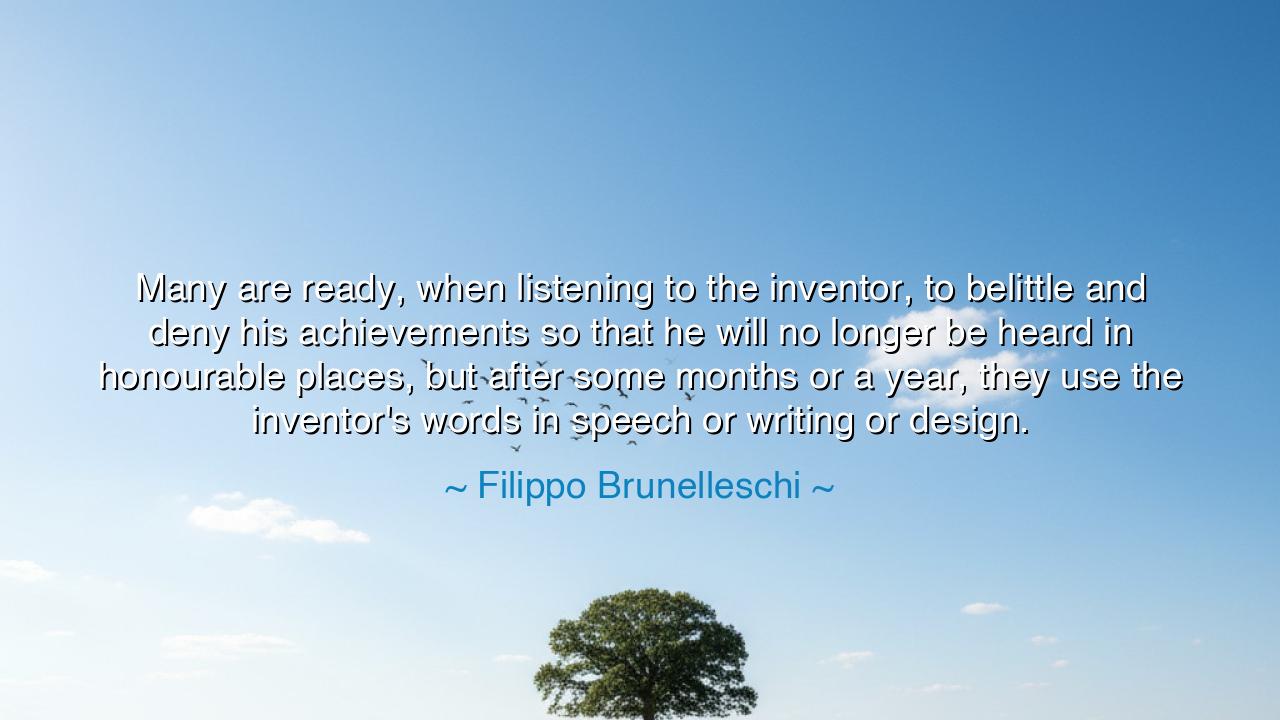
Many are ready, when listening to the inventor, to belittle and
Many are ready, when listening to the inventor, to belittle and deny his achievements so that he will no longer be heard in honourable places, but after some months or a year, they use the inventor's words in speech or writing or design.






“Many are ready, when listening to the inventor, to belittle and deny his achievements so that he will no longer be heard in honourable places, but after some months or a year, they use the inventor's words in speech or writing or design.” Thus spoke Filippo Brunelleschi, the master architect of Florence, the mind that lifted the dome of Santa Maria del Fiore as though it were a crown upon the head of the Renaissance itself. His words, born from the bitter wisdom of experience, reveal an eternal truth about the nature of genius, envy, and time. For he who creates what the world has not yet imagined must often endure scorn before he receives praise; the seed of innovation must first fall into the soil of misunderstanding, only to bloom later into the admiration of those who once despised it.
Brunelleschi knew well the loneliness of the inventor’s path. When he conceived the great dome of Florence—an architectural wonder that would soar without scaffolding, held by its own perfect geometry—many called him a fool. The learned men of his city mocked his ambition, declaring his designs impossible. They could not see what he saw; they could not yet believe what his vision made possible. And yet, when his dome rose above the city, vast and unshakable, those same voices that had scorned him now echoed with praise. This, then, is the heart of his quote: the world resists the new, but once the new proves true, it claims it as its own.
Throughout history, this pattern repeats like a haunting refrain. The innovator walks ahead of his time and thus becomes a stranger to his age. Galileo was silenced by those who could not accept that the earth moved around the sun, yet centuries later his name became synonymous with truth. Van Gogh died in poverty, his art dismissed as madness; today, his vision adorns the halls of museums and the walls of homes. So too did Brunelleschi suffer the sting of dismissal, not because his ideas were weak, but because they were too strong, too bold, too different for the timid minds of his era. The world often mocks what it does not understand—and later bows to it when understanding comes.
In his lament, Brunelleschi describes a cruel irony: those who belittle the inventor do not do so because they hate invention, but because they fear the change it brings. To acknowledge genius is to confront one’s own limits. It is easier to reject a new idea than to reshape the mind that hears it. Thus, people first dismiss what challenges them; but when the proof of greatness can no longer be denied, they quietly adopt the very truths they once condemned. The inventor’s words become their own, his designs become their patterns, and his glory becomes their borrowed light. Such is the curse and the crown of every great creator: to be first ridiculed, then imitated, and finally revered.
But Brunelleschi’s teaching is not one of bitterness—it is one of endurance. He speaks not only to architects and artists, but to all who dare to create, to think, to build something that does not yet exist. His message is this: expect resistance, for it is the shadow that follows every bright idea. Do not measure the worth of your work by the approval of your age. The applause of the moment fades quickly; the judgment of history endures. The true creator must stand firm in solitude, trusting the vision that burns within, even when the world calls it folly. For time, that ultimate sculptor, will one day reveal the truth hidden beneath the laughter of critics.
Indeed, Brunelleschi’s own life is proof of this endurance. When Florence faced ruin, unable to complete its great cathedral, it was his courage that restored faith to the city. He defied doubt, defied tradition, and defied the small-mindedness of his peers. The dome rose not only as a monument of stone, but as a testament to perseverance—to the power of conviction against contempt. Centuries later, his name endures, while the names of those who mocked him are dust upon the wind. This is the final justice of creation: time erases envy but preserves genius.
So let his words be remembered, O seekers of wisdom and makers of new things. When your work is dismissed, when your voice is ignored, remember Brunelleschi. Stand firm in your vision. Let others doubt; let others borrow your ideas when the world is ready for them. Do not seek validation in applause but in the knowledge that you have built something true. For every great invention—be it a dome, a poem, a discovery, or a dream—passes first through the fire of ridicule before it becomes the light that guides others.
Thus, the lesson is eternal: create not for praise, but for purpose. Let the mockery of the moment be as dust upon your path, and walk on, steadfast. For those who once deny you will one day speak your words, build upon your ideas, and live within the world you dared to imagine. And when that day comes, they will call it progress—but you will know it was faith, the quiet faith of the inventor, that made it so.






AAdministratorAdministrator
Welcome, honored guests. Please leave a comment, we will respond soon